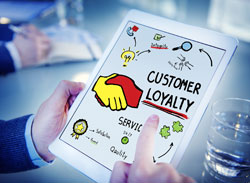With customers being smarter, more cost conscious, more product knowledgeable and more demanding, improving customer service has become a major focus within many businesses.
 In Customer Satisfaction is Worthless; Customer Loyalty is Priceless, author Jeffrey Gitomer contends the real solution is shifting the paradigm away from customer service to customer loyalty.
In Customer Satisfaction is Worthless; Customer Loyalty is Priceless, author Jeffrey Gitomer contends the real solution is shifting the paradigm away from customer service to customer loyalty.
This may be the first step, but the next step is to shift the focus away from loyal customers to loyal employees. By recognizing the significance that the “first contact” a customer has is with the employees.
The foundation for a loyal relationship begins with the employee. In retail and many service businesses, employees experience a short training session usually 16 hours or less. The time is spent viewing required legal videotapes, completing paperwork and learning the basic company policies including from answering the telephone to using the cash register.
Yet, very few businesses actively develop those employees who have first contact with the customer. This results in employees who lack the real skills that are needed to develop those long-term relationships and contributes to the high turnover rate experienced by many retailers.
Imagine developing employees who can answer the following questions consistently and then take the appropriate action:
What do my customers really want or need?
How can I meet their needs?
To create such positive self-aware employees begins with creating good feelings about the individual employees. Techniques such as creative visualization or positive affirmations can enhance the employees’ behaviors.
Creative visualization uses the imagination to visualize and achieve success.
Recent research conducted by the Helsinki School of Business reveals that only 5% of all communication is received as it was intended. In simpler terms, five out our every 100 words are actually received by the customer as the employee intended.
Given the brief dialogue between customers and employees, this research suggests that the source for many dissatisfied customers begins with this first contact. How many orientation sessions actually discuss effective communication skills?
Now imagine developing:
- Employees who are proactive in their communications with customers
- Employees who understand the four fundamental principles of successful interpersonal communication
- Employees who go the extra mile for customers
Possibly by shifting paradigms, businesses can begin to cultivate loyal customers through loyal employees who are self-aware and actively demonstrating successful attitudes, skills and knowledge on a daily basis.
Your business begins and may potentially end with that “first contact.” The question now is “What are you going to ensure that each first contact turns into a second, a third…?
About the Author
Leanne Hoagland-Smith coaches small businesses to large organizations and high school students to entrepreneurs to double performance by closing the gap between today’s outcomes and tomorrow’s goals.




